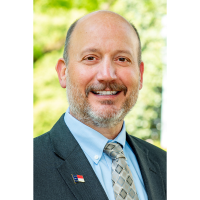Joey Hopkins: From RCC to head of DOT
Joey Hopkins: From RCC to head of DOT
By Gerri Hunt
RCC Director of Public Information
WENTWORTH – In the early 1980s, a group from NC State visited Morehead High School to talk to students about the university’s textile program.
As a junior, Joey Hopkins was invited to the presentation, although he wasn’t sure why he was one of students chosen to attend. After all, he wasn’t the best of students, he admits.
“A lot of my family was in textiles and tobacco, and when I graduated high school, I was accepted into the Textile Management program.”
He headed to Raleigh for his freshman year at NC State, and entered the U.S. Naval Reserves to help pay his tuition.
“I loved the program, but I was not a good student,” he said. “After my first year, I looked at a lot of different programs, and thought maybe there was no future in textiles.”
Hopkins moved back home to Eden, with plans to enter Rockingham Community College. But during the summer of 1985, he went through training with the Naval Reserves, which overlapped with the start of school.
At that time, RCC operated on quarters rather than the current 16-week semesters.
“I missed the first quarter, but I got into the Engineering prep program in the second quarter. The syllabus was designed around the first two years of engineering at NC State, with the same textbooks,” he said. “I stayed at RCC two years including summers, except for that first quarter.”
Hopkins transferred back to NC State to pursue civil engineering, and entered the field of transportation before he even graduated.
He interned with the N.C. Department of Transportation, what is now called a summer assistant job. DOT has 14 geographical areas, and he interned in Division 7, headquartered in Greensboro.
“I was doing inspection work, like working in an asphalt plant, a little surveying, testing concrete for sidewalk, and doing some research,” he said.
Then during his senior year at NC State, Hopkins took a job as a temporary employee with NCDOT.
“I was doing traffic control plans. When you’re building a road, you have to figure out how to manage the traffic,” he said.
Hopkins earned his Bachelor of Science in Civil Engineering – Construction Option.
“And once I graduated, I just stayed on and never left DOT,” he said.
At one point, Hopkins wanted to move back home, but a Greensboro job offer didn’t come with a high enough salary. He also applied for other DOT jobs over the years that he didn’t get.
Nevertheless, during his more than 30 years with DOT, Hopkins has held at least a dozen roles, including deputy chief engineer, division engineer, deputy division engineer, division maintenance engineer, and division operations engineer, all in Division 5.
By the time 2023 rolled around, Hopkins was chief operating officer, overseeing the divisions of highways, rail, aviation, ferries, and integrated mobility (bicycle, pedestrian and transit), and managing communications, human resources, and the office of strategic planning and programming.
That year, Gov. Roy Cooper appointed Hopkins as Transportation Secretary – the highest position with DOT.
“North Carolina has one of the largest Departments of Transportation in the country, with more than 81,000 miles of roads, and 13,000 bridges we maintain. We don’t have a county road system, so roads are either owned by the state, municipalities, or they are private,” he said, adding that North Carolina has more miles of state-supported roads than every other state except Texas.
“I’m proud of all of our modes of transportation, but for the last three years, every month consecutively, we’re breaking records on passenger rail ridership in North Carolina,” he said. “Calendar year 2024 is going to be our biggest year ever.”
North Carolina also has the second-largest ferry division in the country.
“A lot of people don't realize that, but we run seven ferry routes and move thousands and thousands of passengers every year. Some people use a ferry to commute to their jobs and a lot of us use it for recreation, to go on vacation or fishing. A lot of people use it to go shopping, and we have school buses in the northeast part of the state that use a ferry to get the kids to school,” he said.
“Anything you can think about transportation, we’re involved in it in North Carolina. It starts from the planning stages for new transportation projects and working with our local government partners and stakeholders, to building them and then ultimately, you know, maintaining and operating those same systems,” he said.
Hopkins noted that DOT has many job opportunities across the state.
“We love to take people out of the community colleges. If you want to move to a larger city or even stay in your own community, we have opportunities. We post jobs every day,” he said.
Hopkins has lived in Johnston County for 30 years with his wife, who also was a civil engineer with DOT until she retired. They are involved in their local church in Clayton, and he is a Clayton Civitan. They support the Women’s Club and Johnston County Special Olympics. The couple has two sons, a sophomore and a senior at NC State.
“When my oldest son graduated high school, he didn’t know what to do. I told him we’d do whatever he wanted, but I recommended finding a community college and taking some classes, and [the college employees] would help him figure out a path. He went to Johnston Community College,” he said.
“I really believe in our Community College System in North Carolina,” Hopkins said.
When he attended RCC, he enjoyed the small class sizes.
“I think at the time, my biggest class had 20 students... and my math class had 10,” he said. “It wasn’t awesome at first, because that meant the professor knew who you were and if you were keeping up with classwork or not. It put a lot of attention on you as a student, but hindsight being 20/20, that’s what I needed. I needed assistance, direction and oversight in a way, to help me learn how to be a better student and do what I needed to do.”
It was much different than the 200 students in his NC State classes.
Hopkins took calculus, differentials, statistics, physics, and a lot of electives through RCC’s P.E. program.
“I even took gymnastics,” he said with a chuckle. “I wasn’t any good at it, but I enjoyed it. I had some friends in there and we had to do a little routine at the end of the year for our grade. In a way, it kind of completed that college experience because it wasn’t just going to class and going home. On most days, we were there all day. We’d spend time between classes in the student center playing video games and doing homework. It was really positive for me.”
Hopkins praised the whole RCC experience, including “the individual attention, the quality of professors, the good programs… and it costs just pennies on the dollar compared to a four-year college."
________________


